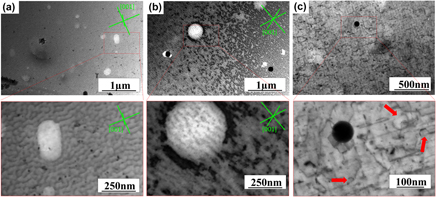Crossref Citations
This article has been cited by the following publications. This list is generated based on data provided by
Crossref.
Wang, Jingjing
Zhang, Meng
Tan, Xipeng
Liu, Tong
Bi, Guijun
Li, Hua
Tor, Shu Beng
and
Liu, Erjia
2020.
Fatigue behavior of ASTM A131 EH36 steel samples additively manufactured with selective laser melting.
Materials Science and Engineering: A,
Vol. 777,
Issue. ,
p.
139049.
Scharifi, Emad
Shoshmina, Daria
Biegler, Stefan
Weidig, Ursula
and
Steinhoff, Kurt
2021.
Influence of Hot Deformation on the Precipitation Hardening of High-Strength Aluminum AA7075 during Thermo-Mechanical Processing.
Metals,
Vol. 11,
Issue. 5,
p.
681.
Peng, Xiang
Liang, Xinli
Liu, Wencai
Wu, Guohua
Ji, Hao
Tong, Xin
Zhang, Liang
and
Ding, Wenjiang
2021.
High-cycle fatigue behavior of Mg-8Li-3Al-2Zn-0.5Y alloy under different states.
Journal of Magnesium and Alloys,
Vol. 9,
Issue. 5,
p.
1609.
Zhou, Zhiqiang
Liu, Xiaoshan
He, Guoqiu
Liao, Yiping
Huang, Ziao
Pan, Jiaqi
Li, Jingquan
and
Wang, Qigui
2022.
A comparison of uniaxial and multiaxial non-proportional fatigue properties in cast Al-Si-Cu-T6 alloys solidified at two cooling rates: Fatigue behavior, fracture characteristics and dislocation evolution.
Materials Characterization,
Vol. 189,
Issue. ,
p.
111957.
das Neves, Erick Cerqueira
do Nascimento, Ezer Guimarães
Sacilotto, Daiana Guerra
Ferreira, Jane Zoppas
Braz Medeiros, Jorge Luis
Biehl, Luciano Volcanoglo
Braga Lemos, Guilherme Vieira
Damas Martins, Carlos Otávio
and
de Jesus Pacheco, Diego Augusto
2022.
Nondestructive analysis of corrosion in ageing hardened AA6351 aluminium alloys.
Materials Chemistry and Physics,
Vol. 291,
Issue. ,
p.
126664.
Li, Y. Larry
Kohar, Christopher P.
Muhammad, Waqas
and
Inal, Kaan
2022.
Precipitation kinetics and crystal plasticity modeling of artificially aged AA6061.
International Journal of Plasticity,
Vol. 152,
Issue. ,
p.
103241.
Kumar, S. Ramesh
and
SreeArravind, M.
2022.
Influence of Si Content on Fatigue Life for Heat Treated Cast Al-Si-mg Alloy Using Different Quenching Technique.
Silicon,
Vol. 14,
Issue. 3,
p.
977.
Dash, S.S.
Li, D.J.
Zeng, X.Q.
Li, D.Y.
and
Chen, D.L.
2023.
Deformation behavior of a newly-developed T4-treated Al–Si die cast alloy.
Materials Science and Engineering: A,
Vol. 866,
Issue. ,
p.
144283.
Chinara, M.
Jayabalan, B.
Bhattacharya, B.
Durga Prasad, A.
Chatterjee, S.
and
Mukherjee, S.
2023.
Low cycle fatigue behaviour study of a nano precipitate strengthened ferrite-bainite 780 steel.
International Journal of Fatigue,
Vol. 167,
Issue. ,
p.
107294.
Parvin, H.
and
Kazeminezhad, M.
2024.
Modeling the effect of Mg addition on microstructure and strength of aluminum during severe plastic deformation.
Journal of Materials Research and Technology,
Vol. 28,
Issue. ,
p.
3013.
Xiong, Daiyu
Huang, Weijiu
Yang, Xusheng
Zhu, Xianghui
Wang, Xin
Liu, Mofan
Xiao, Wenya
and
Li, Mengdi
2024.
Effect of aging state on low cycle fatigue performance of AA 2099 alloy.
Materials Today Communications,
Vol. 39,
Issue. ,
p.
109117.
Liao, Guanglan
Wu, Guohua
Liu, Wencai
Sun, Jiawei
Xiao, Lv
Pang, Song
and
Chen, Peijun
2024.
Microstructure evolution and enhanced fatigue behavior in the Mg-10Li-5Zn-0.5Er alloys micro-alloyed with Yb.
Journal of Magnesium and Alloys,
Vol. 12,
Issue. 8,
p.
3159.
Dash, S.S.
Liu, Z.Y.
Zou, Y.
Li, D.J.
Zeng, X.Q.
Li, D.Y.
and
Chen, D.L.
2024.
Cyclic deformation behavior of an overaged high-pressure die-cast aluminum alloy.
Materials Science and Engineering: A,
Vol. 915,
Issue. ,
p.
147246.
Suthar, Harish
Sharma, Mohit
Bhattacharya, Anirban
and
Kumar Paul, Surajit
2024.
Zone-wise low cycle fatigue behavior of AA6061-T6 similar friction stir welding.
International Journal of Fatigue,
Vol. 182,
Issue. ,
p.
108155.
Paul, Surajit Kumar
2025.
A review on cyclic hardening and softening behavior of alloys.
Journal of Alloys and Metallurgical Systems,
Vol. 9,
Issue. ,
p.
100153.
